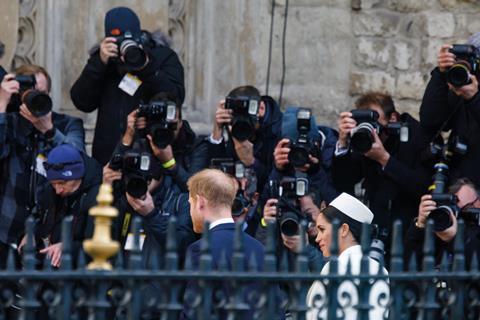The Queen was livid. Her Majesty’s private family pictures were being hawked around London for all the world to see. To protect the royal family’s privacy, she was advised to seek an injunction. It was granted; although the claim had to be brought in her husband’s name because the Queen cannot sue in her own courts.

All this took place more than 170 years ago. In the century and a half that followed the case of Prince Albert v Strange, laws protecting personal privacy developed much more slowly than they have in the past 20 years. But does the law now require the publishers of the Mail on Sunday to pay damages to the wife of one of Queen Victoria’s descendants? That’s the main question at issue in Duchess of Sussex v Associated Newspapers.
In February 2019, the newspaper published extracts from a letter the duchess had sent her father, Thomas Markle, the previous summer. She now accuses the publishers of misuse of private information, as well as breach of her data protection rights and breach of copyright. They deny the claims, arguing there is a public interest in scrutinising members of the royal family who perform official duties.
The Mail also claims the duchess had put the existence of the letter and a description of its contents into the public domain by authorising friends to speak to a celebrity magazine. In addition, her father was entitled to speak about his relationship with his daughter.
A trial is not expected for several months but we saw the opening skirmishes just over a week ago. We were watching remotely, of course, with 76 reporters and members of the public online at one point. But Microsoft Teams, the platform chosen for the hearing, turned out to be less convenient than Zoom and some people who failed to pre-register were denied access.
At the hearing, Mr Justice Warby was asked by Associated Newspapers to strike out parts of the duchess’s particulars of claim. She alleged that the publishers had chosen to ‘deliberately omit or supress parts of the letter in a highly misleading and dishonest manner’. But the Mail argued that allegations of dishonesty were irrelevant to a claim for misuse of private information. In any event, there was no indication of how it might be dishonest to summarise or edit a document for publication.
The duchess claimed that the omitted passages would have been unfavourable to the Mail ‘as one of the tabloid newspapers which had been deliberately seeking to dig or stir up issues between her and her father’. But Antony White QC, for the publishers, dismissed that as a ‘bald assertion unsupported by any particulars’.
In addition, the duchess complained that Associated Newspapers had published nine further articles containing false information about her. White’s response was that damages were available only for unlawful conduct and none of these articles was said to be unlawful. The case would be impossible to manage, he added, if these articles were allowed to become part of it.
Responding on behalf of the duchess, David Sherborne said that White’s argument was confused and inconsistent. While the publishers wanted to strike out the allegation of dishonesty, they were not complaining about claims that they had tried to mislead the public by selective editing. Sherborne argued that they were trying to remove factual elements from the case that undermined their claim to have been acting in the public interest. The Mail had acted dishonestly by omitting almost half the letter while telling readers it was revealing the ‘full content’.
Giving judgment last Friday, Warby struck out the duchess’s allegations that the newspaper had acted dishonestly; that it had deliberately stirred up conflict between her and her father; and that it had ‘an obvious agenda of publishing intrusive or offensive stories about her’. He accepted the newspaper’s arguments that these claims were irrelevant, inadequately detailed or would have made the hearing disproportionately long.
But the judge stressed that the allegations he had struck out did not go to the ‘heart of the case’ — the letter sent by the duchess to her father. That point was picked up by Schillings, her solicitors, who said the ruling made it clear that ‘the core elements of this case do not change and will continue to move forward’.
Why, then, did they include the dishonesty allegations in their claim in the first place and argue that these issues should remain part of the case? Schillings were ‘surprised’ that the judge’s ruling ‘suggests that dishonest behaviour is not relevant’.
But, as Warby explained, dishonesty is not an essential element of the tort of misuse of private information: ‘a media publisher will be held responsible for publication of information which it is wrongful to publish, even if the publisher acts in good faith; and the publisher will be liable for a publication which is not justifiable in the public interest, even if it believed that it was so justifiable.’
Associated Newspapers are entitled to claim victory in round one: the publishers are now demanding costs of more than £50,000 from the duchess’s side. But this was more of a skirmish than a battle — perhaps little more than a sideshow.
The main issue is whether the duchess’s letter was private and confidential. She says it was; the newspaper says she had no reasonable expectation it was or would remain private. And, in any event, the Mail says its right to freedom of expression outweighs the duchess’s right to respect for her private life and correspondence.
Warby did not decide that issue last week, of course. But he did say that the publishers’ challenge to the privacy of correspondence ‘might seem at first a little surprising’, basing his reaction on a textbook he was too modest to admit he had co-edited. But, as the book notes, there are also suggestions in case-law that ‘correspondence is not categorically entitled to protection nor its contents inherently private’.
Once this case has been through the courts, we may need a new chapter in the law of privacy and the media.

































11 Readers' comments